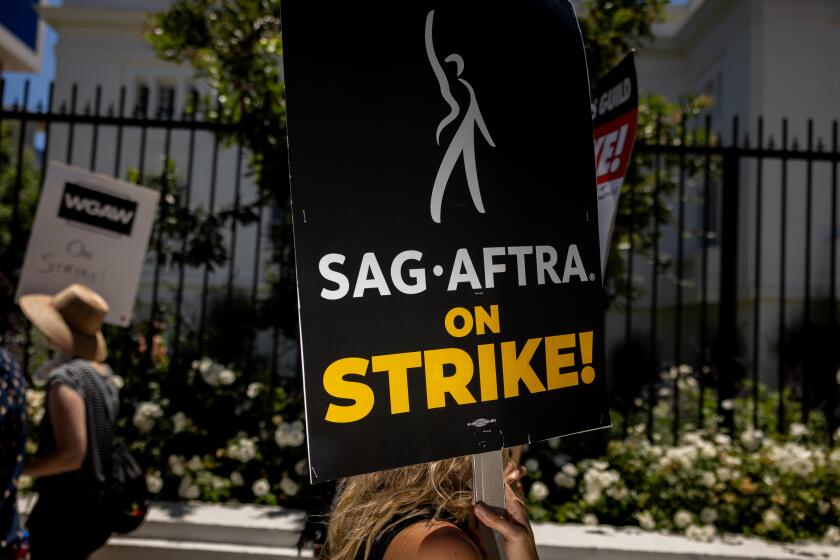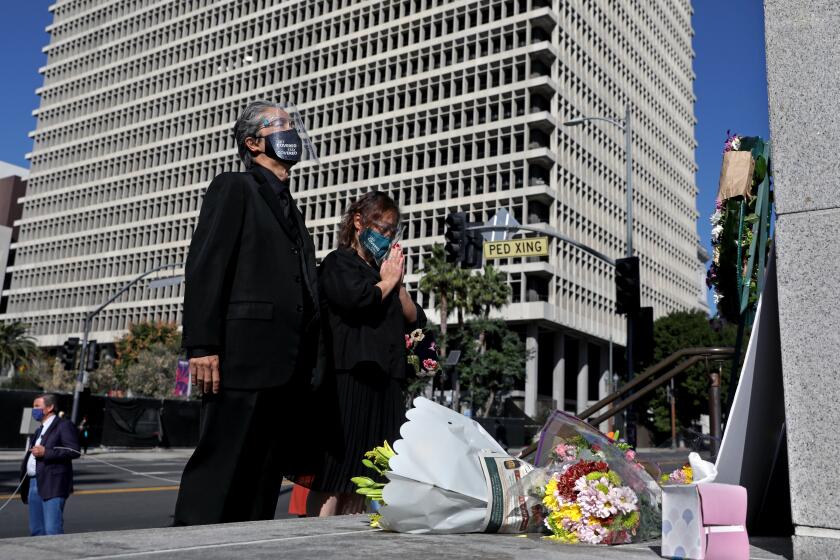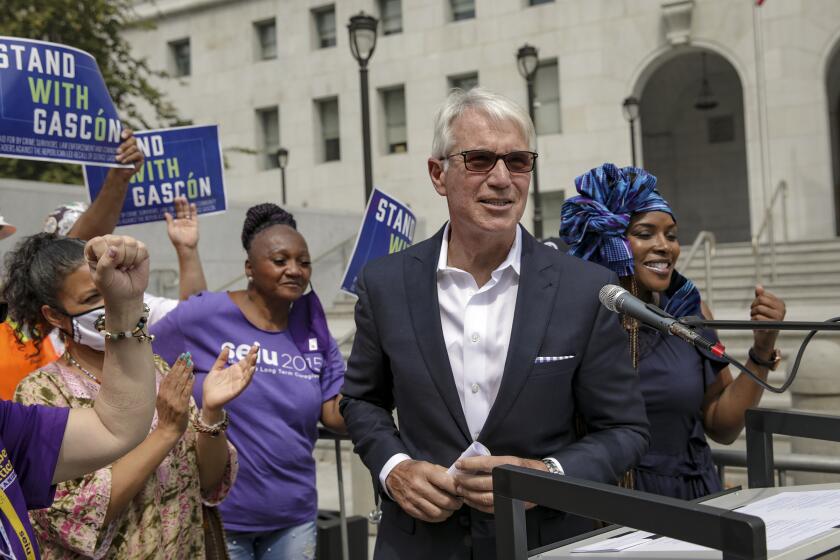Extensive staffing crisis at L.A. County courts puts vulnerable defendants in dire straits

- Share via
Public defenders who work in Hollywood’s decrepit mental health courthouse say they’re juggling at least 500 cases each, a situation so out of control that their boss allegedly proposed a radical solution earlier this year: stop declaring doubts about the ability of their mentally ill clients to stand trial.
Mentally ill defendants arrested on low-level misdemeanors often find themselves languishing in jail as they wait for a date in the Hollywood court, according to public defenders who have worked in the courthouse in recent years, some whom spoke on the condition of anonymity over fear of reprisals from their employer. The building is home to a “very tiny lockup” that overcrowds easily, often causing case dates to be pushed back while public defenders sift through a to-do list that is hundreds of defendants deep, attorneys said.
The caseload crisis boiled over this year during a March training session, when the former head of the mental health unit, Christina Behle, “advised members NOT to declare doubts” about the competency of defendants, according to a written grievance filed by the union representing public defenders that was obtained by The Times.
“Her reason for asking members not to follow the Constitution was the amount of work being too large for the number of attorneys assigned to handle the work effectively,” the document read.
The public defender’s office claims Behle’s comment was taken out of context. After this story was published, Behle sent an e-mail to The Times contending that she was discussing a limited number of cases involving defendants who suffer from substance abuse issues or those who can quickly be restored to competency with medication in the jails.
But several attorneys who spoke to The Times said they took it as an instruction to let defendants face charges they are incapable of understanding for the sake of lightening the staff’s workloads.
With Hollywood paralyzed by writers and actors striking for better pay and benefits, another labor crisis has been playing out behind the scenes in one of the country’s largest court systems. Hundreds of public defenders, prosecutors, court interpreters and reporters have left their jobs since the peak of the pandemic, a Los Angeles legal chapter of the “Great Resignation” that could weaken the county’s ability to provide some basic functions and harm the most vulnerable people in the legal system.
SAG-AFTRA has approved a deal from the studios to end its historic strike. The actors were on strike for more than 100 days.
“It does feel like [the county is] undervaluing the criminal legal system,” said Garrett Miller, president of the Los Angeles County Public Defenders Union Local 148. “We’re doing so much with our clients to help them get into a program, to help them find housing, but in order for all of that to happen, obviously you need to be well resourced. They keep talking about all these problems and wanting to address these problems, but we’re not seeing large-scale investments.”
The staff shortage is often felt hardest by those most at risk of an unfair outcome in the court system: the mentally ill, non-English speakers and lower-income litigants. Complaints about a lack of available interpreters are common in the downtown courthouse, sometimes delaying cases for people in custody and frazzling interpreters asked to cover more hearings than they can handle.
‘It’s obviously not a therapeutic environment’
Some point to the L.A. County Mental Health Court in Hollywood as a microcosm of system-wide problems. Attorneys who have worked in the building said their intense caseloads have a cascading effect.
“We’ve had clients commit suicide in the jail several times in the past year or so. We have clients who are unmedicated in the jail and they pick up new charges,” said one public defender with a caseload of more than 400 mentally ill clients. “It’s obviously not a therapeutic environment to say the least. Everyone has sort of accepted there are just going to be long, long delays.”
Behle, the former head deputy of the mental health unit, did not respond to an e-mail sent before this story published online. After publication, she argued that her comments were in response only to a question about how to aid defendants who were being jailed longer than necessary.
“I explained that oftentimes the lawyer, at the first hearing, cannot truly get the entire picture of what will be the best course of action in each client’s case,” she wrote. “My suggestion was to trail the case for a few days, set it for bail review or pretrial which would not require a time waiver. As explained, when a doubt is declared, criminal proceedings are suspended, their constitutional speedy trial rights are put on hold, and they remain in custody for weeks to get evaluated by a doctor.”
Behle also argued that data show approximately 35% of clients evaluated in mental health court are found competent.
In a written response to the grievance, the public defender’s office said Behle had done nothing wrong and agreed to improve staffing of the mental health unit by providing two law clerks and one intern, but did not offer additional attorneys. Miller said the grievance is under review by the county executive’s office.
Division Chief Mike Suzuki said Behle’s comments were taken “out of context” and had no connection to workload issues. Suzuki said she was talking about a surge in misdemeanor cases “in which attorneys declared doubts, but at least a third of the clients were subsequently found to be competent.”
“Ms. Behle used the spike to impress on attorneys that declaring a doubt automatically suspends proceedings and may subject our clients to extra time in custody while the process plays out,” Suzuki said.
Although several attorneys and the union claim that some public defenders working in the mental health unit have caseloads as high as 500, Suzuki said the average caseload for those lawyers is just 112. The divide between managers and line attorneys on caseloads is part of a broader disagreement within the public defender’s office. Public Defender Ricardo Garcia previously dismissed a Times report in 2020 that found his attorneys were carrying caseloads double or triple their normal size.
In a statement, Garcia said he has worked to blunt the broader staffing crisis by hiring additional support staff and installing a $23-million case management system to better track attorneys’ workloads.
Public defenders across Los Angeles County say their caseloads have doubled, and in some cases tripled, as the coronavirus has all but paralyzed jury trials.
The staffing shortages reach beyond the mental health court, affecting other key aspects of the county’s criminal justice system.
There are no records of at least 52,000 civil proceedings that took place in L.A. County during the first two months of the year, because there were no court reporters present to document them, a situation that David Slayton, the L.A. County Superior Court’s executive officer, called a “constitutional crisis.”
In the downtown criminal courthouse, a manager walked into a hearing last month and told a Spanish interpreter waiting to help a defendant to rush to another courtroom where she was needed. Both the defense attorney and prosecutor on the case turned to the interpreter and said “you can’t leave,” in a tone that was polite but a little bit pleading.
Labor leaders and frustrated courthouse personnel blame the staffing shortage on a combination of factors: the pandemic driving people out of a career path that requires packing into crowded confines, the county’s struggles to pay comparable wages to the private sector, and frustration in some cases with the management styles or policies of Garcia and Los Angeles County Dist. Atty. George Gascón.
There were 808 prosecutors in the district attorney’s office as of mid-June, down from 915 when Gascón took office, records show. Additionally, the courts have lost nearly 200 full-time court reporters and interpreters since January 2020.
Miller, president of the public defenders’ union, said the number of available attorneys in the office has fallen to 599 from about 700 in 2020, when accounting for attorneys on leave. Suzuki provided figures that show the number of “available attorneys” in the office is unchanged, though his data included managers and law clerks who “have their law degrees” and can appear in court on certain matters with supervision.
‘We are working on a skeleton crew’
The lack of interpreters can severely harm mentally ill defendants who don’t speak English or Spanish. The court staffs few full-time interpreters beyond those languages and does not staff any full-time interpreters whose only focuses are Indigenous languages, making it harder for those clients to speak to a clinician and receive a diagnosis.
Union officials say the number of full-time interpreters available in downtown L.A.’s main criminal courthouse has been slashed to just 12, and similar caseload crushes abound.
Spanish-speaking defendants often languish in arraignment court all day waiting for an interpreter to become available so they can understand the charges against them, said Begonya De Salvo, a representative for the union for interpreters in Los Angeles, Santa Barbara, and San Luis Obispo counties.
One June afternoon, as De Salvo was waiting to interpret for a Spanish-speaking defendant trying to accept a plea deal, a court manager appeared and asked her to cover a hearing in another courtroom. Minutes later, someone called the court asking for her as well. Down the hall, a deputy district attorney could be heard complaining that the sex crimes case she was working had been delayed because no interpreter was available.
In one case in March, court records show charges against an assault suspect were dismissed at a preliminary hearing after the court could not provide an interpreter for a key witness who spoke K’iche’, an Indigenous Mayan language. The victim in the case also spoke K’iche’, De Salvo said.
“Basically, we are working on a skeleton crew,” she said.
The pandemic hit the interpreter community especially hard. Several L.A. County interpreters died of COVID-19 and many complained of being forced to work in unsafe conditions, a complaint validated when the California Division of Occupational Safety and Health slapped L.A. County’s Superior Court with fines for health and safety violations. De Salvo said some colleagues left the profession due to low pay or health risks during the pandemic and an additional 115 interpreters are expected to reach retirement age in the next two years.
The finding of serious violations were a blow to a court system that consistently defended its pandemic safety practices in the face of mounting public criticism.
Slayton, the court’s executive officer, told The Times that he is “absolutely committed to making sure people have language access,” but did not know of any situations in which the court had failed to meet “timely” requests for interpreters.
In the case where charges were dismissed due to the absence of a K’iche’ interpreter, court spokesman Robert Oftring said prosecutors had only requested one interpreter when they actually needed two, and did not ask for the second until the day of the hearing.
Neither the prosecutor assigned to the case nor the district attorney’s office responded to questions about the dismissal.
Although De Salvo and others have complained of low pay driving interpreters out of L.A. County, Slayton said interpreters received a 12% raise during their last round of contract negotiations, a massive increase compared with the minuscule pay increases in prior years. The median salary for full-time L.A. County interpreters is now $93,000, Oftring said, which appears to be on par with salary ranges for interpreter job listings in neighboring counties.
When asked about situations that a Times reporter witnessed in which court staff asked interpreters to leave one hearing in order to cover another, Presiding Justice Samantha Jessner said she’d look into it but warned that there was “probably more to that story.”
‘Our future does not look bright’
Slayon and Jessner have been dealing with dual staffing crises of interpreters and court reporters, who create official transcripts of proceedings that are crucial for appeals and ensuring there are detailed accounts of the hundreds of thousands of court hearings that take place each year. Although California law requires felony criminal cases to be documented by a reporter, the Superior Court has been forced to abandon recording certain probate and family law cases due to the staffing shortfall.
“There are many times when self-represented litigants will go into a courtroom, especially in family law, where a very, very impactful decision is made and everybody in the courtroom is using lots of legal jargon ... and then that litigant will go to a lawyer and say, ‘I can’t see my kids anymore or now I have to pay this much,’ and historically a prospective lawyer could go get the transcript and figure out what happened,” Jessner said. “That is essentially not a reality anymore.”
Slayton said the Superior Court simply can’t compete with private-sector firms that can offer reporters as much as $5,000 per day to cover a deposition. Pay raises, retention rewards for long-term employees and signing bonuses of $20,000 are doing little to attract new reporters to the field, he said. When accounting for projected retirements, Slayton is worried that the court won’t have enough reporters to cover its regular felony case schedule by 2025.
“Our future does not look bright, with regards to this,” he said.
In the district attorney’s office, where there have been departures amid frustrations with Gascón’s management style and policies, there has been an effort to replenish the ranks to address what some call a concerning backlog of cases. Gascón’s office has hired 58 new prosecutors since his election, said Tiffiny Blacknell, the district attorney’s director of communications.
As they try to recall Los Angeles County Dist. Atty. George Gascón, prosecutors still must carry out the enormous workload of the office. With distrust running high, even mundane tasks get more complicated.
Public records show that approximately 10,000 criminal cases presented by law enforcement in 2021 and 2022 were still awaiting a filing decision in the county. Among those are defendants charged with murder, drunk driving that resulted in injuries, domestic violence and weapons offenses.
Records show that law enforcement agencies present an average of 180,000 cases to the district attorney’s office each year. Laura Jane Kessler, head of the office’s charge evaluation division, said she was unaware of any situation in which the statute of limitations ran out on a case pending a charging decision.
“We have such a high volume that I don’t even know what that number of cases in queue should be,” she said. “Really the question is not how many, but what kinds of cases, how much time has passed between the time it was submitted and the time we act on it.”
Eric Siddall, vice president of the Los Angeles Assn. of Deputy District Attorneys, said there are fewer prosecutors working in L.A. than at any other time in his 20-year career, leaving them feeling as overburdened as their public defender colleagues.
“We don’t have enough prosecutors in this office and the office is literally at a breaking point,” Siddall said. “Once people become overwhelmed with a job, through no fault of their own, just because of poor management, that’s when you start losing more people, and when you’re not able to recruit replacements.”
More to Read
Sign up for Essential California
The most important California stories and recommendations in your inbox every morning.
You may occasionally receive promotional content from the Los Angeles Times.


















